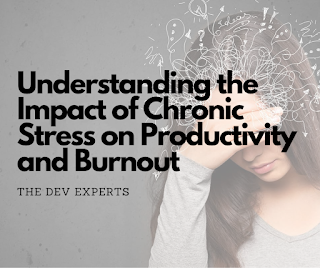In today's fast-paced and ever-changing world, chronic stress has become the new normal. With the rise of technology and the constant need to stay connected, many individuals find themselves feeling overwhelmed, exhausted, and depleted. According to a recent Forbes headline, "Chronic stress is the new normal." This statement is not only concerning but also highlights the need for a better understanding of how chronic stress affects our productivity and overall well-being.
Stress is a normal part of life, and it can be both positive and negative. A Hungarian endocrinologist named Hans Selye, known as the "Father of Stress," was the first to provide a scientific explanation for biological stress. He described stress that negatively affects us as Distress, while stress that has a positive impact he called Eustress. In small doses, stress helps us stay alert, fuels motivation, and supports us as we adapt to new experiences. However, when the scales are tipped towards distress, we feel overwhelmed, exhausted, and depleted.
Selye broke down his model of stress into three distinct stages, known as the General Adaptation Syndrome (GAS), or the Stress Response. The three stages are alarm, resistance, and exhaustion. When a stressor is detected, the body responds with a "fight-or-flight" response. The sympathetic nervous system is stimulated, and the body's resources are mobilized to meet the perceived threat or danger. During the resistance stage, the body focuses resources in dealing with the stressor and remains on high alert until the threat subsides. If the stressor(s) continue to overwhelm the body's capacity, our resources become exhausted. This stage is the home of chronic stress and, eventually, burnout.
When our bodies are repeatedly flooded with stress hormones, our resources are depleted, compromising our ability to respond quickly to threats even when we are not under direct stress. This constant state of stress can lead to burnout, which is characterized by physical and emotional exhaustion, cynicism, and a reduced sense of accomplishment. It is a serious problem that is affecting not only individuals but also organizations as a whole.
Organizations are committing to greater investments in mental health, stress and resilience training, along with mindfulness and meditation programs. However, these measures alone are not enough to address the root cause of increasing stress levels. To truly address the issue of chronic stress and burnout, it is important to understand the underlying causes and to make changes at both the individual and organizational level.
Chronic stress is a significant problem that is affecting productivity and overall well-being. By understanding the impact of chronic stress and the underlying causes, we can take steps to address the issue and create a healthier and more sustainable work environment.









2 Comments
لینکسازی یکی از استراتژیهای کلیدی در سئو سایت انگلیسی است که شامل ایجاد لینکهای داخلی بین صفحات مختلف سایت و کسب لینکهای خارجی (Backlinks) از سایتهای معتبر میشود. لینکسازی داخلی به بهبود ساختار سایت و تسهیل دسترسی کاربران و موتورهای جستجو کمک میکند، در حالی که لینکهای خارجی میتوانند اعتبار و قدرت سایت شما را در نتایج جستجو افزایش دهند.
ReplyDeleteاستفاده از محتوای چندرسانهای مانند تصاویر، ویدئوها و انفوگرافیکها توسط شرکت سئوکار به کمک خدمات سئو سایت میتواند به جذب بیشتر کاربران و کاهش نرخ خروج (Bounce Rate) کمک کند. این نوع محتواها نهتنها تجربه کاربری را بهبود میبخشند، بلکه باعث میشوند که کاربران بیشتری زمان خود را روی سایت شما بگذرانند. علاوه بر این، موتورهای جستجو به سایتهایی که تنوع محتوایی دارند، ارزش بیشتری میدهند.
ReplyDelete